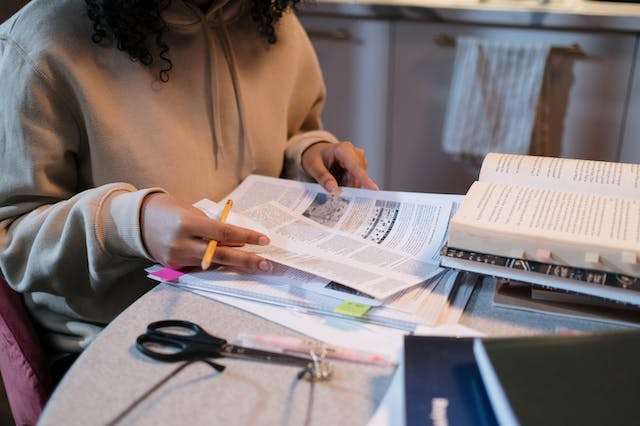Tips and Tricks to Help Reduce Your Exam Anxiety
Exams stress a lot of people out, which is pretty understandable as they’re the culmination of everything you’ve learned in your classes.
Because of this, they have a massive impact on your grade as a result or are potentially the last thing standing between you and your dream career. Either way, you’ll have spent plenty of time learning and mastering various subjects and reinforcing that knowledge through studying.
While it may seem like the exam itself is the hardest thing to deal with in this situation, in actuality it often isn’t. The anxiety and stress it brings are oftentimes more difficult to handle than the actual exam—thankfully, that’s exactly what we’re here to help you with today.
Whether you’re preparing for the final test of an important class or are doing some real estate exam prep in California, the following tips will help you reduce your test anxiety and make that final hurdle a bit easier to clear. To start, we’ll start with the tips that can be done before the test begins.
Keep Your Caffeine Levels Balanced
While caffeine can help you focus, too much can actually make your anxiety worse. Pay attention to how much caffeine you usually intake and try to keep the levels balanced until after the exam is over.
While you probably expect that coffee has caffeine, other drinks also have it, such as soda and energy drinks. It’s best to avoid energy drinks and supplements before an exam as they contain an excessive amount and can have some frightening symptoms, especially if drunk on an empty stomach or by those who aren’t used to that much caffeine.
Iced coffee also has more caffeine and should probably be avoided before an exam for similar reasons. However, not taking any while being used to it can cause its own array of symptoms, such as headaches and increased anxiety. Try to keep your caffeine levels balanced to keep your anxiety to a minimum.
Exercise for a Bit
A common way to reduce anxiety is to exercise regularly, which is not only a generally healthy habit to have, but it also helps you burn off excess energy. If you don’t regularly exercise, then consider starting a simple routine leading up to exam day and exercise before you take the exam.
The best part is that this routine can be whatever you want it to be. You could do some simple stretches, go for a jog, or even try out a few yoga poses. Your anxiety will melt away a bit more with every movement, and while it probably won’t eliminate it completely, it will reduce it and make what’s left easier to handle.
Examine the Exam
Both of the tips that are mentioned above will help you before taking the actual exam. They won’t be very helpful once it begins though, so these next two will focus on what you can do once the exam begins.
The first thing you should do after you’ve named and dated the test appropriately is examine the test and answer the questions you definitely know the answer to. This will help boost your confidence, can help you remember the answer to some of the more tricky questions and, most importantly, will show your brain that the anxiety isn’t necessary.
More often than not the thought of doing a challenging task is more frightening than the task itself is. Once you get started on the exam and find your rhythm, your anxiety will start to back off and may even disappear completely.
If the question requires you to write an essay, then you can either use the provided pre-writing space to outline what you believe you need to cover to answer the prompt or just immediately jump into an intro. The sooner you get started, the faster the anxiety will possibly be gone.
Try Breathing Exercises
While all of the above tips have been good, this last one is probably the most important one to consider. Breathing exercises are good to temporarily either reduce or completely eliminate anxiety, and they can be done anywhere.
Having a few ready-to-go on test day can keep your anxiety down as you work, especially when you find the more difficult questions. The best thing to do is to practice a few breathing techniques in the days leading up to the exams to find what works for you, but if this isn’t an option, then you’ll need at least a few basics.
For one, focus on deep breaths that take as long, if not longer, to exhale than they do to inhale, as inhaling too quickly can cause you to hyperventilate. You can also try counting as you inhale, hold your breath, and exhale; this can also help prevent you from inhaling too quickly.
Overcoming Potential Exam Anxiety
Anxiety and stress aren’t bad on their own; they can actively push you to be better, prevent procrastination, and even keep you focused on your academic goals. However, they become problems if left unchecked.
Each person is different, and the methods that work for you may not work for everyone else and vice versa. We hope that the methods we’ve discussed can help you reduce your exam anxiety and help you pass your test with flying colors—good luck!


![Entrepreneurial Story of the Igwe Twins [Started as Office Cleaners]](https://thetotalentrepreneurs.com/wp-content/uploads/2016/09/Entrepreneurial-Story-of-the-Igwe-Twins-Started-as-Office-Cleaners-SpeedMeals-Mobile-Kitchen.png)


